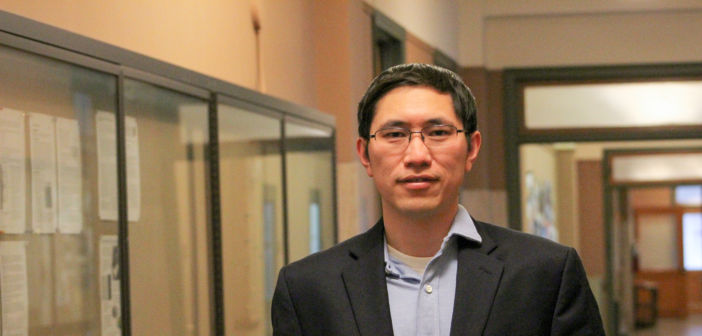Tucked away in a row of laboratories on the third floor of Sinclair Lab, Yaling Liu, a professor of bioengineering and mechanical engineering, and his team are developing a “lab on a chip” device with cancer detection and drug screening applications.
Liu said his team has been working on the device for the past four years, but it wasn’t until about a year ago that the project significantly materialized.
In November, Liu was named an American Society of Mechanical Engineers Fellow. The society, a not-for-profit membership organization, has more than 130,000 members in 158 countries. Only about 3,000 of those members have attained the distinction of fellow.
Liu said the distinction is a recognition of all his work and overall research, as well as his service contributions to the American mechanical engineering community.
Graduate student Wentao Shi researches cancer and growth in Liu’s lab. He said the detection device can be used to isolate tumor cells and determine how many tumor cells are in the blood, which can reveal the status of the tumor.
“We are right now geared more toward clinical application, which would be to use it as a monitoring tool to monitor tumor growth,” Liu said. “We are hoping to do some drug screening applications as well.”
Liu said the device is mainly used for cancer research as a monitoring tool, rather than a drug screening tool. He said he hopes using the device to screen drugs will provide more data and additional information about genetics and which drugs work for individuals.
The lab-on-a-chip device also provides an alternative to animal and human drug testing.
Graduate student Christopher Uhl, who specializes in cardiovascular work in the lab, said animal testing is very expensive and time consuming. He said because there is so much variation between individuals, it is difficult to establish a baseline of how well a drug works.
Liu said it is dangerous and painful to test drugs on human patients, so by deriving cells and culturing them, his lab can test drugs with the device to avoid testing on humans. The data would produce pre-screening advice for doctors, so they can directly use one type of drug on patients.
Liu said the Lehigh Valley Hospital is interested in the chip’s drug screening applications.
“They hope that this will be a tool that could be available to them,” he said. “So they want us to demonstrate that it is working.”
Liu said that once the medical professionals are confident the device is working, they want to involve his lab and the device in a larger clinical trial that uses the device as a monitoring tool. However, the device is still in a preliminary trial period.
Liu’s body of work and research is extensive. He conducts interdisciplinary research and has worked in a large variety of areas.
Although his expertise lies primarily in engineering fields, Liu collaborated with Linda Lowe-Krentz, the chair of biological sciences, to plan aspects of the lab-on-a-chip project related to endothelial cell behavior and normal function.
“We obtained funding for a collaborative project from the Biosystems Dynamics Summer Institute managed out of the biological sciences department and worked to help his students learn to grow endothelial cells, as well as how to optimize the materials used in his chips for healthy growth of endothelial cells,” Lowe-Krentz wrote in an email.
Liu’s other areas of research include mathematical sciences, nano-technology and biointerface design.
Liu said his lab doesn’t fall into any of the traditional categories — he calls it an interdisciplinary research lab focused on biomedical application-driven research.
Uhl said the work done in Liu’s lab requires a lot of time, effort and funds.
“He’s a great adviser,” Uhl said. “We are always glad to have these opportunities, and he does a great job of supporting us.”






Comment policy
Comments posted to The Brown and White website are reviewed by a moderator before being approved. Incendiary speech or harassing language, including comments targeted at individuals, may be deemed unacceptable and not published. Spam and other soliciting will also be declined.
The Brown and White also reserves the right to not publish entirely anonymous comments.